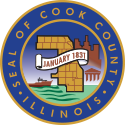Chicago Region is Named A Leader In Sustainable Transportation
December 7, 2012
Cook County Board President Toni Preckwinkle and Chicago Mayor Rahm Emanuel announced today that the Chicago region has been named a 2012 Metro-Scale Sustainable Community Leader by the Institute for Sustainable Communities. The award recognizes Chicagoland’s ongoing leadership in sustainable transportation. Cook County and Chicago share the honor with Will County, the City of Evanston and the Village of Oak Park.
President Preckwinkle spoke at a regional transportation workshop sponsored by the institute at the Chicago Metropolitan Agency for Planning on December 5. The workshop, titled “Collaborating for Sustainable Transportation in Chicagoland,” was hosted by the County, Chicago and its award partners.
“Cook County has taken an active role in bringing together the suburbs, the city and other counties to collectively find better sustainable transportation solutions,” President Preckwinkle said in her speech. “As part of our objective to work collaboratively, we have expanded the focus of the county’s Department of Transportation and Highways to undertake regional strategic planning and attract new financing opportunities. Our recent decision to invest county resources to rebuild a truck route along Harvey’s industrial park is a good example of strategic transportation planning that will potentially generate thousands of jobs and promote economic growth in the entire south suburban region.”
“Increasing sustainability throughout Chicago can create dramatic economic opportunity throughout our neighborhoods and improve the overall quality of life for residents,” Mayor Rahm Emanuel said. “From making transformative investments in the CTA to offering residents and businesses the densest network of electric vehicle charging stations in any city to installing hundreds of miles of bike lanes, we will continue to look for ways to make Chicago more sustainable, helping to create jobs and improve quality of life in the city.”
The goal of the Metro-Scale Sustainable Communities Leadership Academy is to advance regional collaboration on environmental issues by bringing together local governments, nonprofits, expert speakers, and sharing the success stories of environmentally friendly regions and communities. The Chicagoland region’s accomplishments will be the subject of ISC’s next report, to be used as a model for cities and suburbs across the United States.
President Preckwinkle said Cook County received the honor because of its ongoing regional collaboration and effectively pursuing “twin goals” of sustainability and economic growth.
“One of our economic development objectives is to create more jobs in southern Cook County within walking distance of public transportation so that we lower the cost of getting to work,” she said. “We are also revising our tax incentives to make sure that county residents with the necessary skills are connected to newly created jobs at firms receiving tax breaks.”
Through the Bureau of Economic Development, the County is working to remove obstacles to the redevelopment of infill sites in south and west Cook that foster stronger public transit or cargo-oriented economic development. Meanwhile, the county departments of Planning and Development and Environmental Control are pursuing brownfield remediation grants in an effort to remove a key barrier to redevelopment.
Among the leaders who participated in the academy’s discussions on ways to expand sustainable transportation were: Herman Brewer, chief of the Cook County Bureau of Economic Development; Deborah Stone, director of the Cook County Department of Environmental Control; Karen Weigert, Chief Sustainability Officer, City of Chicago Mayor’s Office; Randy Blankenhorn, Executive Director, Chicago Metropolitan Agency for Planning; Scott Bernstein, President and Co-Founder, Center for Neighborhood Technology; and Ron Burke, Executive Director, Active Transportation Alliance.
